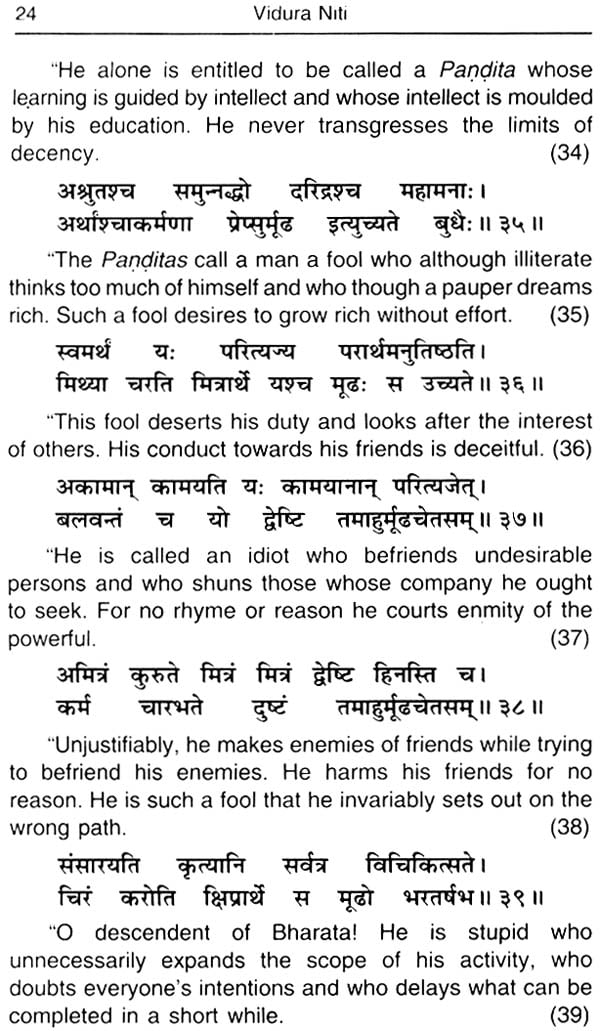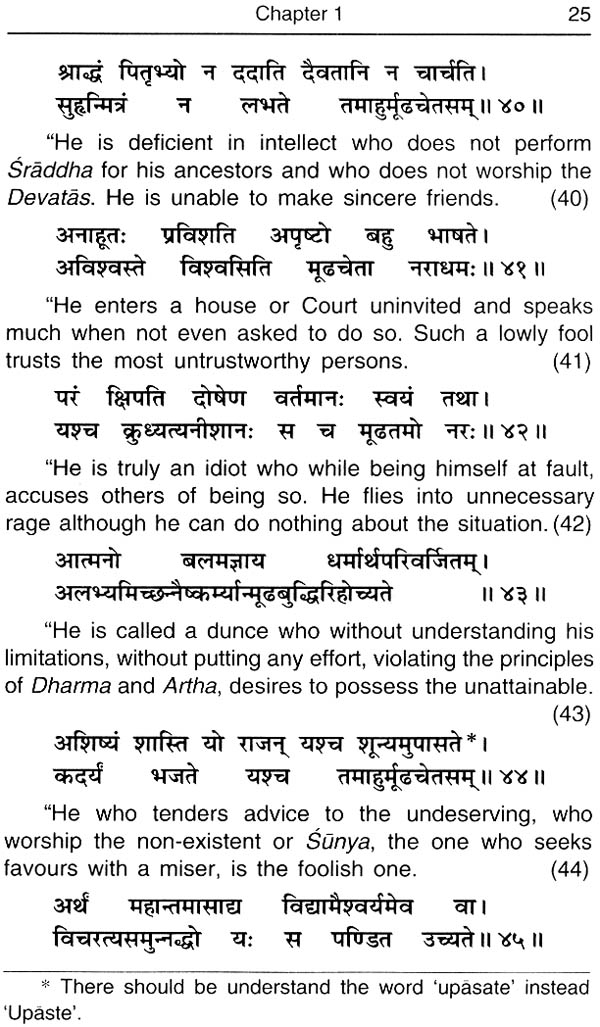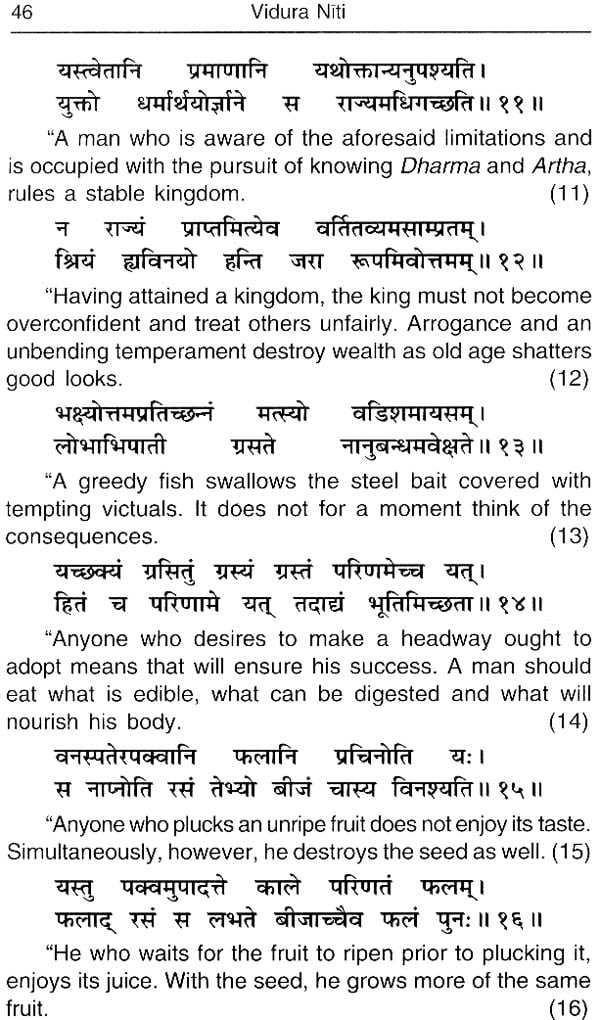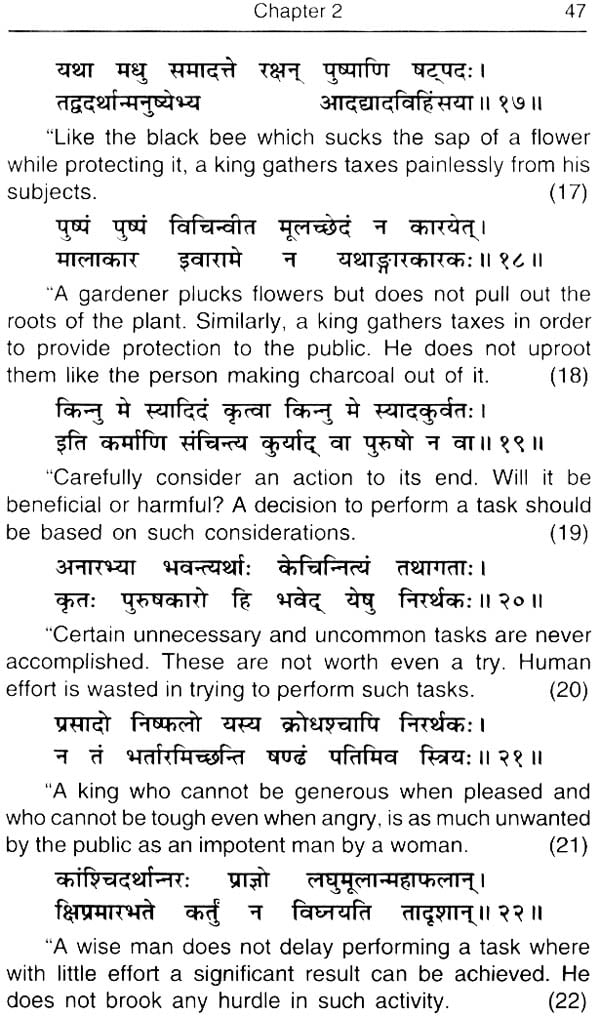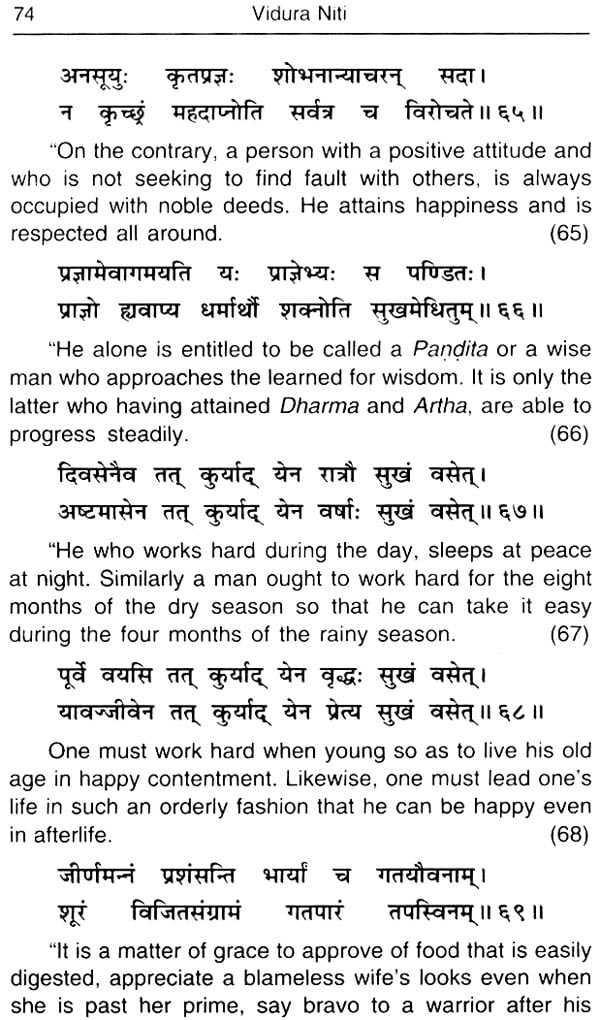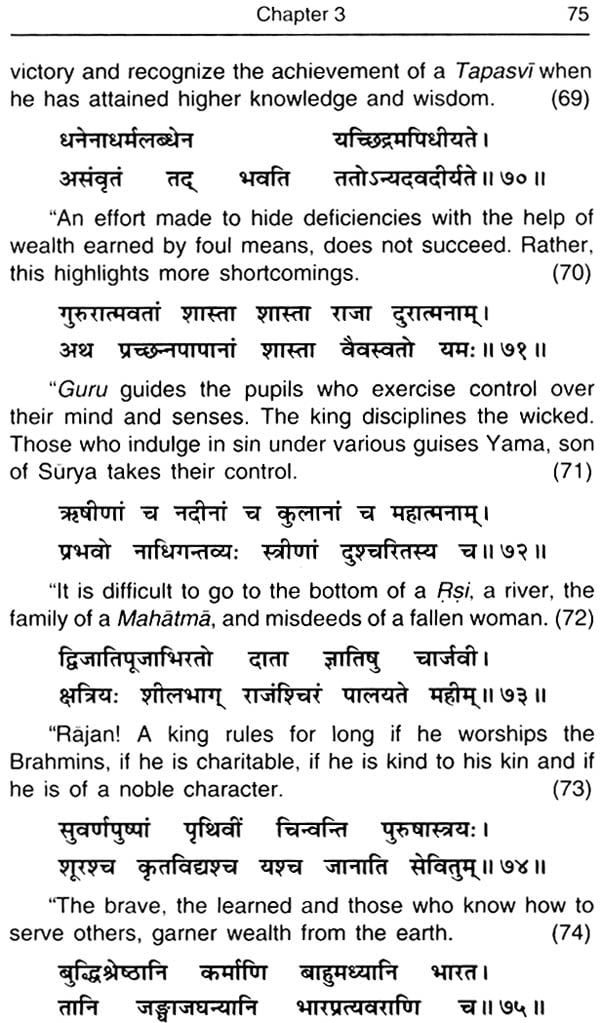
Vidura Niti (Mahabharata - Udyogaparva)
Book Specification
| Item Code: | NAL025 |
| Publisher: | Gita Press, Gorakhpur |
| Language: | Sanskrit Text With English Translation |
| Edition: | 2022 |
| Pages: | 144 |
| Cover: | Paperback |
| Other Details | 8.5 inch X 5.5 inch |
| Weight | 120 gm |
Book Description
Vidura Niti is a well-known and highly beneficial part of the Mahabharata. In these chapters, Mahatma Vidura has explained to the King, Dhrtarastra several issues relating to human welfare in this and the other world. The following extract consist of eight chapters (33-40) of the Udyoga Parva of the Mahabharata. Several Sanskrit commentaries have been published on the Vidura Niti.
In these chapters, while advising on the duties of a king, that is Raja Dharma, several other issues have been discussed in eye-catching detail. Some of these are: Polity, interaction, treatment of others, truthful behaviour, Dharma, means to achieve happiness and eschew actions that lead to suffering, discrimination between undesirable and desirable qualities, importance of renunciation, different facets of justice, Truth, human welfare, forgiveness, non- violence, attributes of a friend, and consequences of ingratitude. The author has lucidly delineated the duties of a king while stressing upon the virtue of giving up greed.
Vidura Niti will benefit the illiterate as well the learned, the adults, the aged and the young, the women, the rulers and the subjects, the rich and the poor, the teacher as well as the student, those busy in serving others, and those desirous of living a clean and happy life.
The Stokes have been translated in simple language. We hope that Indians of whatever class or region they might belong to benefit from this book.
The conversation reproduced below takes place between the Hastinapur king, Dhrtarastra and his cousin Vidura. It is contained in eight chapters of the Udyoga Parva of the epic, the Mahabharata.
A tussle is going on between the king's sons, the Kauravas led by Duryodhana, the eldest prince and their cousins, the Pandavas, led by Yudhisthira for an equitable division of the kingdom. Sanjaya, the king's confidante and charioteer, had gone to placate the Pandava princes. The tidings he brought gave no cheer to the blind king who wanted his son, Duryodhana to inherit the entire kingdom.
The narrator is R$i Vaisarnpayana, a celebrated pupil of Vyasa. He is said to have recounted the whole of Mahabharata to king Janamejaya, son of Panksita, grandson of Arjuna, the Pandava prince.
| Sloka No. | Topic | Page |
| 1-6 | Vidura admitted to the King's presence | 17-18 |
| 7-8 | Vidura inquires a worried Dhrtarastra the reason for his being summoned | 18 |
| 9-12 | Dhrtarastra explains his worry and requests a solution | 19 |
| 13-19 | Vidura describes the situations which keep a man awake. He taunts the king for the injustice done to Yudhisthira | 19-21 |
| 20-34 | The attributes of a Pandita | 21-24 |
| 35-44 | How to identify an idiot? | 24-25 |
| 45 | Who is a Pandita? | 25-26 |
| 46 | Condemnation of a person who does not share his wealth other members of the family | 26 |
| 47 | A wrong deed is visited upon the doer alone | 26 |
| 48-49 | The importance of intellect. How to wisely use one's intelligence? | 26 |
| 50 | Lack of wise policies can destroy a king | 27 |
| 51 | Situations where a person must share his thoughts etc. with others | 27 |
| 52 | In praise of truth | 27 |
| 53-56 | In praise of forgiveness | 27-28 |
| 57 | In praise of Dharma & Knowledge etc | 28 |
| 58 | When are the kings and the Brahmins losers? | 28 |
| 59 | In praise of persons who are polite in speech | 28 |
| 60 | Persons who follow others blindly. | 28-29 |
| 61 | Know your limits | 29 |
| 62 | When is Grhastha or a Samnyasi looked down upon | 29 |
| 63 | The two persons who deserve a place in paradise | 29 |
| 64 | When is well-earned wealth misused? | 29 |
| 65 | Who deserve to be punished with death by drowning? | 29-30 |
| 66 | The two types of person who atain paradise | 30 |
| 67-68 | The three means to attain success. Three types of human beings | 30 |
| 69 | Persons who do not deserve to be rich | 30 |
| 70 | The three evils which destroy a human being | 30 |
| 71 | The three gates of hell | 31 |
| 72 | The three sources of happiness | 31 |
| 73 | The types of persons who deserve to be protected | 31 |
| 74 | The four types of persons who ought to kept at a distance by the king | 31 |
| 75 | The four types of dependents who deserve a shelter | 31 |
| 76-77 | The four situations which yield result quickly | 31-32 |
| 78 | The four deeds which make a person fearless | 32 |
| 79 | The five entities who deserve to be worshipped | 32 |
| 80 | The five acts which bring glory to man | 32 |
| 81 | The five types of person's who depend upon a king | 32-33 |
| 82 | Failure of even one of the five senses can harm a person | 33 |
| 83-85 | Six Undesirable qualities | 33 |
| 86-87 | Virtues which must not be given up | 33-34 |
| 88 | Desirability of overcoming 6 bad habits | 34 |
| 89-90 | The six types of persons who depend on others to make a living | 34 |
| 91 | Lack of care can destroy farm, cattle etc | 34 |
| 92-93 | Six types of persons ignored by the other six | 35 |
| 94 | Six sources of happiness on this earth | 35 |
| 95 | The six types of persons who are always unhappy | 35 |
| 96-97 | Seven bad habits, a king must give up | 35-36 |
| 98-100 | 8 indicators of the decline of a person | 36 |
| 101-103 | 8 sources of happiness | 36-37 |
| 104 | 8 virtues which elevate a person | 37 |
| 105 | Know your body which is endowed with many entrances | 37 |
| 106-107 | 10 types of person ignorant of Dharma | 37 |
| 108-110 | Advice tendered by Prahlada to his son | 38 |
| 111-115 | Qualities of a warrior, a wise king and a noble person | 38-40 |
| 116-119 | Qualities of a person who can impress his public | 40-41 |
| 120-123 | who is superior among the learned? | 41-42 |
| 124-126 | Qualities of a man who shines like the sun | 42-43 |
| 127-128 | Vidura Councils Dhrtarastra to handover half of the kingdom to the Pandava Brothers | 43 |
| Chapter-2 | ||
| 1-3 | A worried Dhrtarastra seeks counsel for his welfare | 44 |
| 4-5 | Vidura promises to tender honest advice only | 44-45 |
| 6-7 | Do not follow the path of untruth even if that leads to success | 45 |
| 8-9 | Keep in mind the purpose and result to be achieved in any activity | 45-45 |
| 10-11 | An unthinking king loses his kingdom | 45-46 |
| 12-13 | Wealth is destroyed by unfair treatment of others | 45-46 |
| 4 | Advice regarding digestible foods | 46 |
| 15-16 | The time to pluck a ripe fruit | 46 |
| 17-18 | Painless collection of taxes | 47 |
| 19-20 | Do not take a step forward without weighing its consequences | 47 |
| 21-22 | When do the subjects approve of a king? | 47 |
| 23-26 | How should a king look after his subject? | 48 |
| 27-28 | Injustice destroys a Kingdom. Practice of Dharma brings prosperity | 48-49 |
| 29 | Damages caused by a lack of Dharma | 49 |
| 30-31 | Justification for the destruction of an enemy for self-preservation | 49 |
| 32-33 | Garner your wisdom from various sources | 49-50 |
| 34-37 | Don't underestimate the strength of a superior | 50 |
| 38-40 | Several types of protectors Good conduct is superior to lineage | 50-51 |
| 41-43 | Good conduct is superior to lineage | 51 |
| 44-46 | I n praise of the truthful | 51-52 |
| 47-48 | In praise of good conduct | 52 |
| 49-51 | Consumption of food by different A lack of control over the five senses | 52-53 |
| 52-53 | Various sources of fear | 53 |
| 54-55 | A lack of control over the five senses leads to decline | 53 |
| 56-57 | Self-control leads to victory and success | 54 |
| 58-59 | How are wealth and success achieved? | 54 |
| 60-65 | Advantages of a control of the five senses | 54-55 |
| 66-69 | Lust and anger wipe out wisdom | 55-56 |
| 70-73 | Avoid bad company | 56-57 |
| 74-75 | The importance of forgiveness | 57 |
| 76-80 | The advantage of polite speech | 57-58 |
| 81-83 | A lack of wisdom leads to defeat | 58-59 |
| 84-86 | Vidura narrates the qualities of Yudhisthira | 59 |
| Chapter-3 | ||
| 1 | Dhrtarastr wants Vidura to tell him more about righteous Conduct | 60 |
| 2-3 | Vidura advises the king to treat others kindly | 60 |
| 4 | Virtuous conduct in this world ensures passage to the Swargaloka | 60 |
| 5-38 | The story of kesini and of meditation by prahlads in the dispute between his son virocana and the Brahmin, Sudhanva | 60-67 |
| 39 | Vidura advises the king not to resort to falsehood for the sake of land | 68 |
| 40-41 | The importance of intelligent conduct in achieving success | 68 |
| 42-45 | Even the knowledge of Vedas cannot protect a deceitful person | 68-69 |
| 46-48 | Certain evil deeds are as pernicious as the killing of a Brahmin | 69-70 |
| 49-50 | 8 situations in which a human being can be tested. 8 destructive habits | 70 |
| 51-52 | 8 virtues that help in the creation of wealth, add to longevity etc. | 70-71 |
| 53-55 | The importance of a king's noble conduct | 71-72 |
| 56-57 | 8 paths to righteous conduct | 72 |
| 58 | The importance of Dharma and the truth | 72 |
| 59-65 | The 10 pathways to heaven | 72-74 |
| 66-68 | The importance of wisdom and discretion | 74 |
| 69-71 | Wealth acquired through foul means dos not overcome short-comings | 74-75 |
| 72-74 | Desirable qualities in a king who wants rule for a long time. 3 types of persons who benefit the most from the earth | 75 |
| 75 | Identification of good and of evil deeds | 75-76 |
| 76-77 | Advice to the king to treat his nephews like a father | 76 |
| Chapter-4 | ||
| 3-Jan | Dialogue between Dattatreya and the Devatas | 77 |
| 4 | Dattatreya advises patience and the pursuit of truth | 77-78 |
| 8-May | The importance of the spoken word | 78-79 |
| 11-Sep | The rewards of forbearance | 79-80 |
| 15-Dec | The importance of the spoken word | 80 |
| 16-21 | How to identify different types of persons | 80-82 |
| 22-24 | Dhrtarastra wants to know from Vidura the qualities of human beings born to noble families | 82-83 |
| 25-28 | The downfall of noble families | 83 |
| 29-31 | The importance of noble conduct | 83-84 |
| 32-33 | The person who are unsuitable to be in a court or belong to the king's family | 84 |
| 34-35 | How to receive a guest? | 84-85 |
| 36-38 | Attributes of a good friend | 85 |
| 39-40 | The disadvantages of a person who is unstable is conduct and thought | 85-86 |
| 41-45 | The unstable temperament of an evil person | 86-87 |
| 46-47 | Be indifferent to happiness or sorrow | 87 |
| 48 | Lust destroys wisdom | 87 |
| 49-50 | A disturbed Dhrtarastra looks for peace | 87-88 |
| 51-54 | Vidura advises the king how to be at peace? | 88-89 |
| 55-57 | Person who are inimical can never be happy | 89 |
| 58-60 | Damage done by internal differences. The importance of a well knit group | 89-90 |
| 61 | The downfall of those who harass Brahmins an women | 90 |
| 62-65 | Unity is strength | 90-91 |
| 66-67 | Do not harm the Brahmins, the cows, the children or the women | 91 |
| 68-69 | The conquest of anger | 91-92 |
| 70-74 | Vidura advises Dhrtarastra to amicably settle the dispute between his sons and the Pandavas | 92-93 |
| Chapter-5 | ||
| 1-6 | Who are chosen for hell by the messengers of Yamaraja? | 94-95 |
| 7-8 | Is the policy of retribution desirable? | 95-96 |
| 9-11 | Why can't a human being live to a 100 years? | 96 |
| 12-13 | Evil deeds akin to the killing of brahmins | 96-97 |
| 14-16 | The qualities of a person who deserves to go to heaven. Who is a true friend of king? | 97-98 |
| 17-18 | The virtues of renunciations | 98 |
| 19-21 | Gambling, the root cause of all evil | 98-99 |
| 22-23 | How does a king retain the trust of his subordinates? | 99-100 |
| 24-27 | The importance of competent subordinates | 100-101 |
| 28-29 | Be alert while choosing an activity | 101 |
| 30 | Do not lend to such people | 101-102 |
| 31-32 | 8 virtues which enhance the human excellence | 102 |
| 33-34 | The utility of a bath and of a frugal meal | 102-103 |
| 35-36 | Persons who should be kept at an arms-length: no shelter; no request for help | 103 |
| 37 | 6 types of person who must not be catered to or pampered | 103 |
| 38-39 | The time to move into the Vanaprastha Asrama | 103-104 |
| 40-41 | The secret of all achievement | 104 |
| 42-46 | The undesirable consequences of the war with the Pandavas | 104-105 |
| 47-50 | Dharma cannot be devorced from Artha, abstain from sin by intellect. An evil person notices only the undesirable habits of others | 105-106 |
| 51 | Who deserved the kingdom? | |
| 52-55 | 5 strong points of a human being | 106-107 |
| 56-57 | Never earn the enmity of a stronger person. The learned never trust such a person | 107 |
| 58-59 | The importance of wisdom | 107 |
| 60-62 | Your relatives can be like fire hidden in wood | 107-108 |
| 63-64 | Vidura says that the Kauravas and the Pandavas must live in harmony | 108 |
| Chapter-6 | ||
| 1 | Suitable welcome to respectable elders a must | 109 |
| 2-3 | The welcome rituals of a guest | 109 |
| 4-5 | Categories of person who though not deserving a welcome, must be treated well as guests | 109-110 |
| 6-7 | Attributes of a Samnyasi and of a Vanaprastha . | 110-111 |
| 8-9 | Do not earn the enmity of a wise person. Do not repose blind faith in anyone | 111 |
| 10-11 | How should a man protect a woman? Why do women deserve protection? | 111-112 |
| 12-14 | Choice of a person for safe upkeep | 112 |
| 15-21 | Qualities of a king who lasts long. Even a minister need not be privy to the king | 112-113 |
| 22-24 | Evil deeds lead to undesirable consequences | 113-114 |
| 25-26 | The qualities of a successful ruler | 114 |
| 27 | A king must not be greedy | 115 |
| 28-29 | A subdued enemy must be put to death | 115 |
| 30-33 | Control of anger and giving up unnecessary disputes is beneficial | 115-116 |
| 34-35 | Dependence upon an unwise person can be dangerous | 116 |
| 36-37 | The winning qualities of a king | 116 |
| 38-39 | 7 secrets of addition to wealth | 117 |
| 40-41 | Never harm an innocent person | 117 |
| 42-43 | A kingdom must not fall into the hands of a women, a gambler or a child | 117-118 |
| 44-45 | Who is a wise person? | 118 |
| 46-47 | Vidura's advice: handing over kingdom to Duryodhana would be ruinous for the empire | 118 |
| Chapter-7 | ||
| 1 | Dhrtarastra believes that human beings are subject to fate | 119 |
| 2-4 | Vidura's advice: "take care of which way the wind blows". How to endear yourself to others? | 119-120 |
| 5 | The possibility of the death of a hundred princess just to please Duryodhana | 120 |
| 6-7 | Beware of such success as could lead to failure | 120 |
| 8-9 | Do not befriend the rich who lack virtue. Dhrtarastra expresses his inability to give up siding with Duryodhana | 120-121 |
| 10-13 | The qualities of a humble person. It is undesirable to deal with evil persons | 121 |
| 14-16 | Do not be friendly with a man who is evil | 121-122 |
| 17-32 | Vidura advises the king to protect his kinsmen and be fair and just to the Pandavas | 122-125 |
| 33-35 | Qualities of person who stay praise- worthy for a long time | 125 |
| 36-38 | 6 Habits which ought to be give up | 125-126 |
| 39-41 | Importance of knowledge and the desirability of looking after the elders | 126 |
| 42-43 | How is lineage judged? | 126-127 |
| 44-47 | Preservation of self-acquired wealth protection of one's near and dear ones | 127-128 |
| 48-50 | The desirability of giving up friendship of a foolish person | 128 |
| 51-56 | It is not desirable to either deny the pleasures of senses or to give them unbridled freedom | 128-129 |
| 57-59 | The importance of forgiveness importance of sustained effort | 129-130 |
| 60-64 | How to deal with a cunning person in order to protect wealth? | 130-131 |
| 65-68 | Consequences of certain actions | 131-132 |
| 69-71 | Different class of people have different strength | 132 |
| 72-76 | Persons who can be trusted and those who cannot be. Importance of paying respect to the teachers | 132-133 |
| 77-81 | Signs of Old-age in different groups of person | 133-134 |
| 82-85 | Vidura's advice to the king to treat his sons and nephews on an equal footing | 134-135 |
| Chapter-8 | ||
| 1-3 | How to acquire happiness and fame in a short duration | 136 |
| 4 | An attitude of negativity is like courting death | 136-137 |
| 5-6 | 7 shortcomings of a student | 137 |
| 7-11 | Sources of dissatisfaction. Essentials of a good household | 137-138 |
| 12-13 | Never give up the righteous conduct | 138-139 |
| 14-18 | The inevitability of death. Hence the desirability of accumulating good deeds | 139-140 |
| 19-22 | Wipe out ignorance with knowledge | 140-141 |
| 23-25 | The virtues of detachment | 141-142 |
| 26-28 | The path to Swargaloka for the Ksatriyas, the Vaisyas and the Sudras | 142-143 |
| 29-32 | Vidura advises Dhrtarastra to be fair and just to Yudhisthira. However, the king although in agreement with him, decline his advice | 143-144 |
